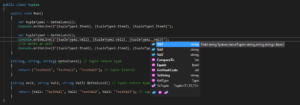It’s time to write short summary about Get Noticed 2017 challenge, because it is going to finish at the end of this month.
Well, I can admit it was a good time. It gave me a lot. This challenge motivated me everyday to learn new things and write about it on my blog. I chose to create an application using ASP.NET Core WebApi and Angular2 – ELP. Unfortunately I haven’t finished my app yet, but it’s important I tried to and finally I found a time to work on it in my spare time, after work.
I want to continue work on the ELP application in the next months to finish it some day
and release, I want to finish it by the end of the year, but we will se how it goes.
Blogging takes a lot of time so I will write less frequent than previously, to focus more on coding, but I’m not going to stop blogging so I encourage you to add my blog to your feeds, to be updated.
During DSP/Get Noticed 2017 I realized that it’s very hard to do pet projects after working hours
and focus on them in 100%. How much time do you have after work? I mean free time when you can do nothing. From my observations it’s about 2-3 hours.
You can spend all night of course, but the point is to do something after hours and be productive next day as well. What do you think about it? You can write me in a comment. It’s always a lack of time and because of it, some programmers
quit their job to have more time to focus on their projects. It’s also an option to consider –
if you are not addicted to money 😉
Besides summer is coming and the weather is great, so it’s good to go outside and move a little, e.g. ride a bike or travel. I’m going to do it and I recommend you to do the same, because it helps to create new ideas and extends our horizons, and after short break you can start to work with motivation and head full of ideas.
